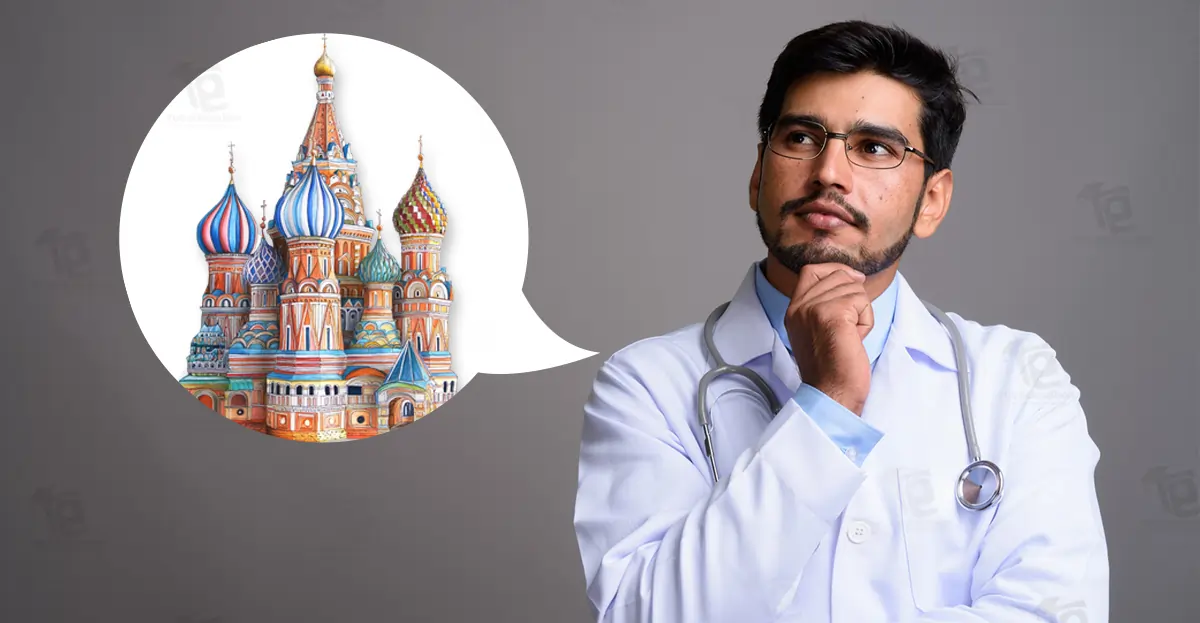MBBS in Russia has gained massive popularity among Indian students and other international aspirants during the past few years. With affordable tuition fees, world-class universities, and globally recognised medical degrees, Russia is an attractive destination for medical education. Yet, there is still one question that has been at the forefront of students’ and parents’ minds:
“Is the Russian language a barrier to studying MBBS in Russia?”
Through this blog, we are going to break down the truth behind the Russian language barrier, the impact on academics, clinical training and how it can easily be countered.
Why Students Prefer MBBS in Russia
However, prior to proceeding with the language dimension, here is a brief showcase of reasons why Russia is a remarkable choice as a destination to study MBBS:
- Low and transparent fee schedule (no donation fee or capitation)
- Internationally accredited universities (certified by NMC, WHO, ECFMG, etc.)
- English MBBS courses
- Modern infrastructures and clinical exposure
- A simple way of admission without an entrance exam in most universities
- Multicultural experience, safe environment
These advantages turn Russia into one of the best options for future doctors. But what about the language?
Is the MBBS Program in Russia Taught in English?
Yes, various Russian medical universities for Indian students provide MBBS courses, which are taught in English. Universities like:
- Kalmyk State University
- Perm State Medical University
- Mari State Medical University
- Pskov State University
- Tula State University
- Tver State Medical University
- Orenburg State Medical University
and several others offer full English medium instruction, at least during the initial 3 to 4 years of the program.
But when you enter clinical training (usually starting in the 4th year), knowing the Russian language is essential, particularly with patients at hospitals.
The Role of the Russian Language in MBBS Education
Here are some points that will show you the role of the Russian language in MBBS education:
Year 1-3: Pre-Clinical Phase
- In the first years, the mode of teaching MBBS in Russia in English. It is used in teaching all theoretical subjects such as Anatomy, Physiology, Biochemistry, Pathology, etc.
- The introductory classes on the Russian language are also provided to students in the first semester to help them adjust to daily life and prepare for future clinical years.
Year 4-6: Clinical Phase
- Clinical rotations are about direct contact with patients in hospitals.
- The majority of the local patients and hospital personnel are non-English speakers; thus, the communication should occur in Russian.
- The medical curriculum can still be conducted in English, but clinical communication, history-taking, and patient care will require speaking Russian.
Is Russian Language a Barrier or Just a Challenge?
It is time to be straight: the Russian language is not a barrier while pursuing MBBS in Russia, it’s a manageable challenge.
Every year, thousands of Indian and international students complete their MBBS in Russia every year despite starting with zero knowledge of the language.
This is why it does not matter so much:
- Language classes are built into the curriculum from day one.
- Colleges and universities offer language teachers who are qualified to teach international learners.
- Academic Russian is hard to learn in comparison to conversational Russian (and medical one in particular).
- Within 6-12 months, the majority of students feel fluent in speaking basic Russian.
- Indeed, as quite a number of students report, learn Russian for MBBS gives an extra skill to their resume. This skill may also prove helpful in case they wish to work in a multilingual environment or aim to pursue opportunities overseas.
Real Student Experience: What Do Alumni Say?
Indian students who have done MBBS in Russia usually say:
“At first, Russian seemed very tough. But regular classes and daily interaction helped a lot. By the time we reached clinical years, we could speak with patients confidently.”
“Knowing Russian helped us during clinical practice, in public places, and even for internships after graduation.”
This is a clear indication that the language is one of the issues when one first participates, but then it becomes the journey of learning, rather than a barrier.
Tips to Overcome the Russian Language Barrier
If you are planning to pursue MBBS in Russia, then here are some tips that would help you master the language:
Take Language Classes Seriously
Begin to study even on the first day. Medical terms and simple chatter.
Practice Daily
Talk to classmates, roommates or shopkeepers in Russian. The practice in the real world is quicker than practical knowledge.
Use Language Apps
There are such apps as Duolingo, HelloTalk and Babbel that assist with pronunciation, vocabulary, and structure.
Watch Russian Shows or Listen to Local Music
This enhances your ability to listen and helps you get used to the accent and tone.
Form Study Groups
Language practice also becomes more interactive in groups, and it is more enjoyable.
What Happens If You Don’t Learn Russian?
Neglecting the language may result in:
- Clinical rotation problems (problems communicating with patients and physicians)
- Loss of confidence in the practical examination
- Limited internship and employment opportunities in Russian-speaking areas
- Lower overall MBBS experience
Simply said, studying Russian is not a matter of choice, but one of the keys to a successful experience at Russian medical universities for Indian students.
On the Whole!
Having learned everything about it, we will conclude that the Russian language will not become a barrier to your MBBS career – it will only be a small obstacle, which can be easily overcome. You could learn Russian and succeed in your clinical years with commitment, practice and the support of your university.
Moreover, speaking Russian not only enhances your education but also can lead to better internships, patient care, and flexibility in your career.
Further, looking for professional advice on selecting the appropriate university and campus language-sensitive? Contact Rus Education now and get yourself one step closer to becoming a globally trained doctor, a confident, bilingual, and future-proof doctor!
FAQs About Language Barrier for MBBS Students in Russia
Q.1 Is MBBS in Russia taught in English?
Answer- Yes, most of the leading universities in Russia have MBBS courses in the English language, which are offered to international students, mostly during the pre-clinical years.
Q.2 Do I need to learn Russian to study MBBS in Russia?
Answer – Yes, Russian will be necessary in particular clinical years when you will have to communicate with local patients and the staff of the hospital.
Q.3 How long does it take to learn Russian for MBBS students?
Answer – Through consistent use and university-sponsored practice, students can gain basic fluency in 6-12 months.
Q.4 Can I survive in Russia without knowing Russian?
Answer – Yes, in the first years, but during clinical rotations and everyday life, it is expected that you should know Russian.




